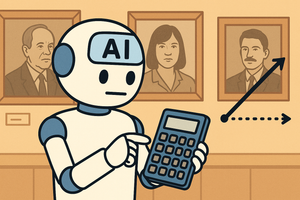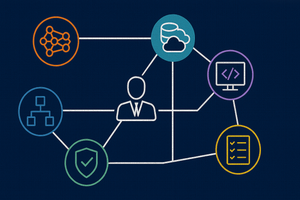About Microsoft Certification Exams
The Microsoft Certified Professional program started in 1992, and quickly became one of the most popular vendor-specific certification programs in the industry.
While some don't value technical certifications--and I respect that position--I've found them helpful. I find that studying for and passing a certification exam requires me to explore the "dusty corners" of the technical products I use, which I might not otherwise schedule time for given the daily demands of my work. While preparing for exams, I invariably discover new features and capabilities I didn't know about that end up being helpful in later projects.
The process I've developed to prepare and pass engineer-level certifications has remained more or less consistent for me over the years. I wanted to make this post to describe my process in case it helps someone else. There's nothing here about exam content--these are study tips only!
I admit up-front this is merely what works for me. Everyone learns differently, and this may not be the process that works best for you!
There Are No Shortcuts
One thing I want to be very clear on is that these aren't "Cliff's Notes" for Microsoft exams. It's not possible (in my opinion) to find an ethical shortcut to passing these exams. This process isn't presented as a shortcut, but a roadmap for the journey.
Process Overview
My process includes the following eight steps, which I'll describe in more detail and explain why each is important later in this article.

1: Video Course
Not everyone is a visual learner like me, and if you learn better from long-form textbooks, then go ahead and substitute a book instead of a video course.
That said, I find a video course is a great way to review a product from end-to-end, especially if the product is new, updated, or there are many features I've not used yet.
I find Coursera and Udemy to be very effective, but that doesn't discount that there are other excellent options out there.
What I look for when selecting a prep course:
- I prefer a course specifically designed for the exam I'm planning (i.e. the exam number is called out in the title). This helps ensure the instructor stays on the exam coverage outline and doesn't stray into related (but not tested) topics.
- I look for instructors who are Microsoft Certified Trainers (MCTs) if I can find them because they're typically the best at translating exam outlines into professional-quality instruction.
- Alternatively, I look for instructors who are highly experienced practitioners of the product who will impart a lot of "from the trenches" tidbits not in the product documentation (two birds with one stone).
Do I complete all the labs and exercises?
I will absolutely retain important terminology and step-by-step process information better if I do the exercises prepared by the course instructor. I have to do hands-on to retain practical knowledge. If I complete course labs and exercises, I need to do less product practice (Step 4).
But I don't always do all the labs and exercises for a variety of reasons. But I know when I skip labs, I need to budget more time in the product practice step 4.
2: Microsoft Learn
After finishing a video course, I turn to Microsoft Learn's learning path search page. Microsoft typically does an excellent job of indexing online training content by exam, so it's usually easy to identify what content was developed with a specific exam or certification in mind.
I usually find topics covered in the Learning Path content that weren't covered in a video course--or find that they were covered in a different way. For this reason, I don't see MS-Learn and Video Courses as substitutes. They're complimentary.
The learn content typically includes practice tests, which I take and re-take until scoring > 80%. However, while the practice tests cover the knowledge on the exams, they aren't necessarily in the same format as the real test, and a third-party practice test company like MeasureUp is where I get a better simulation of what a real test will be like.
3: MeasureUp Phase 1
The current leading and recommended-by-Microsoft practice test partner is MeasureUp. I generally find that these are excellent practice tests, and well worth the cost to purchase them.
In this Phase 1 of practice test prep, I start taking short batches of questions randomly selected from all topics. I usually select 20 questions at a time. I don't let myself see all the questions yet. I don't over-do it. In the final push toward the exam (Step 6), I don't want to have already memorized all the test questions!
The goal in this step is to get a "feel" for what the questions are going to be like and detect any topics that weren't covered in the video or MS-Learn academic courses. I typically find some exam content didn't make its way into courseware, but the practice exam caught them.
Conversely, I remain vigilant to ensure that exam prep questions are still relevant (checking the exam outline on the learn site). Microsoft sometimes removes topics from the testing outline (e.g. when a product feature is deprecated or replaced), and practice tests may not have been updated. It's pointless to study old product features that are no longer tested (believe me, I've been there/done that!).
4: Product Practice
After completing a video, and MS-Learn tutorials, and sampled the MeasureUp practice exam, I've developed a good sense of what features I'm already expert at, and which I've not used very often--or were unaware of!
In this step, I get into the product and use those features. If the feature is creating a networking environment in Azure--I create one! If the feature is to write an Azure Function--I write one! Usually making these relevant to my own work keeps this interesting and memorable.
5: Schedule Exam
Once I've completed the academics, am hitting 80% on small MeasureUp batches and have practiced unfamiliar features, I schedule the exam for a week in the future. Nothing focuses the mind like a deadline!
I don't schedule too far out--having test prep top-of-mind is helpful, and if I wait too long, I'll start to forget the details.
6: MeasureUp Phase 2
In the days leading up to the exam, I go for broke on taking practice tests, taking as many questions at a time as I have time for. I typically take exams with all the questions each night.
As I take each practice test, I turn on the feature that lets me review correct and incorrect answers while I take the test--even for questions I get right! I turn off the timer to focus on understanding the questions and answers thoroughly.
I learn a lot by reading the explanations of why questions are right and wrong. This helps not only understand why I was wrong (or right) but reading "answer is incorrect because" explanations helps rule out distractors on the real test.
7: Microsoft Learn Site Search Practice
Microsoft has enabled the ability to search for and read content on learn.microsoft.com while taking the exam. This is a response to the age-old complaint, "Why would I memorize that when I can look it up in the real world?"
So, yes, they let you look it up. And it's great. But here are some caveats you should know:
- This feature in the test environment is limited to content on learn.microsoft.com.
- The search engine is OK, but not great. You can't use bing.com or google.com in the test center, you can only use the search within the site.
- This is most useful for looking up things like the exact spelling of a command line parameter (was it --agent or --agents???) or API endpoint, for example.
- These are timed exams. If there's a concept you haven't mastered, don't bet on being able to use the Learn site to research it as you take the test--there's not enough time for that.
I spend time preparing for searching:
- I make sure I know what's on the learn website for the exam outline and what's not. I don't want to waste time looking for information that's not there.
- I practice how I would find the details I typically need to look up using only the MS Learn site search box and table of contents. I'm bad at remembering the names of CLI parameters, so I practice looking them up until I can do it in a few seconds.
8: Pass the Exam!
At this point, I know I have a good chance of passing the exam! I know I won't pass if I haven't mastered the material, but this framework helps me prepare effectively and systematically.
A Final Note
Timed exams are stressful, and if you're like most people, you'll feel it. You'll see question #1 and it will seem like something you've never seen before--and you'll think, "I'm definitely going to fail this exam". I know...been there/done that!
Know that the hardest content can be presented first. Rest assured that some easier questions are coming, and after you calm down and get into your groove you can (usually) go back and fix your earlier answers.
Good luck!



